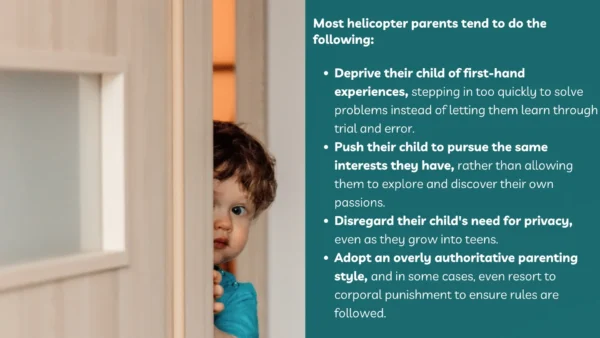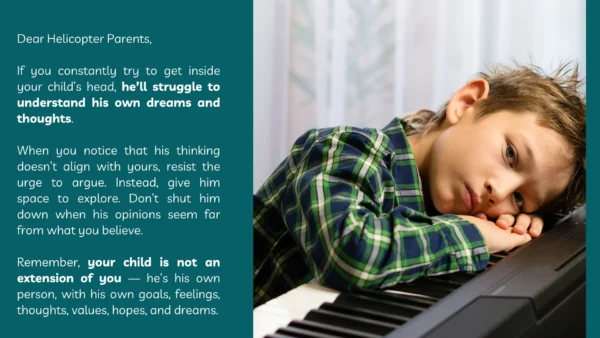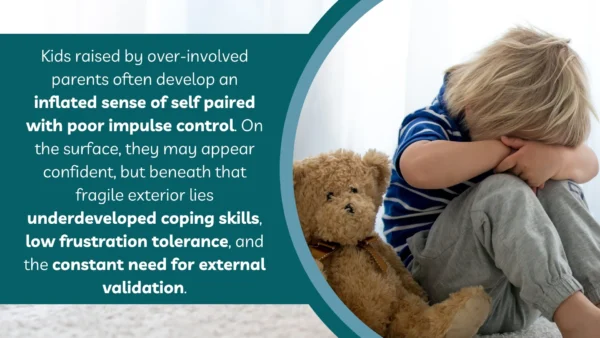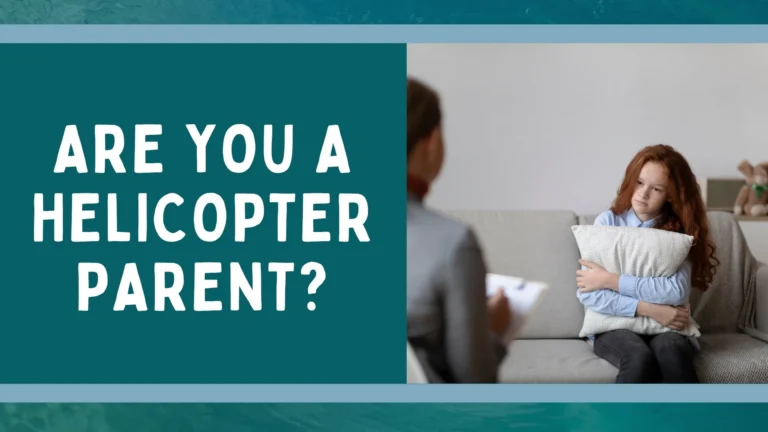Have you ever been called a helicopter parent? Or had that suspicion you’re slowly turning into one? Worry not. Helicopter parents aren’t necessarily bad. It only shows you’re human and you love your child fiercely.
However, it’s important to recognize when parental involvement crosses the line. Despite good intentions, helicopter parenting can clip your child’s wings and hold them back from soaring as high as they’re truly capable of.
That’s why today, we’re breaking down everything you need to know about helicopter parenting — its causes, signs, negative effects, along with helpful reminders.
Because sometimes, the best ways to discipline your kids and raise them to be strong and well-rounded adults involve doing the hardest thing of all… stepping back and letting them stumble.
What’s Meant by Helicopter Parenting? Defining the Helicopter Parenting Style
The term “helicopter parent” was coined in the late 1960s by Dr. Haim Ginott. In his best-selling book Between Parent and Teenager, Dr. Ginott quoted a boy describing his mother as someone who “hovers over him like a helicopter.” The image stuck, and since then, the words “helicopter mother,” “helicopter parent,” and the like have crashlanded into people’s vocabulary.
Simply put, helicopter parents are overly controlling parents.
Helicopter parents tend to take too much responsibility for their children’s safety, academic performance, and extracurricular activities. All too often, helicopter parents are so proud of their parenting style that they don’t see anything wrong with it.
Examples of Helicopter Parenting
Ever wonder if you’re a helicopter parent? Not every helicopter parent realizes they fit the description because helicopter parenting involves varying degrees of parental involvement. To help you understand this parenting style, I’ll share common examples and behaviors that often signal overparenting.

Early Childhood and Elementary School
- You constantly direct or correct your toddler’s behavior, rather than allowing them to explore, make mistakes, and learn on their own.
- You become overly cautious or anxious about your child’s participation in sports, extracurricular activities, or even free play, such as exploring the park or climbing the jungle gym.
- You handpick your child’s friends, which limits their natural development of socialization skills.
- You routinely do your child’s homework or rush to school to deliver forgotten assignments or lunch, preventing them from experiencing natural consequences.
- When your child confides in you about conflicts with classmates or peers, you immediately intervene to resolve the issue rather than coaching your child to handle it themselves.
- Instead of suggesting activities based on your child’s interests, you dictate what activities they should pursue and closely monitor their performance or progress.
Teenage Years and Emerging Adulthood
- You call or message your high school or college student multiple times a day to check on their whereabouts, grades, or personal life.
- You manage administrative tasks for your teenage or adult child.
- Instead of providing emotional support and space for emotional development, you intervene frequently in your adult child’s relationships and other social affairs.
- You keep monitoring their academic performance, expressing dissatisfaction if they don’t align with your preferences.
- You override important decisions, such as course selection, major choices, or internship opportunities.
- You express constant worry over their psychological well-being but refuse to give them the space to develop independence or resilience.
What Leads to Helicopter Parenting?

For many parents, it starts with fear. We worry too much that our children might feel left out, struggle in academics, or face disappointments in ways we could have prevented.
Watching our children scuffle through life feels agonizing, although deep down, we know those bumps in the road teach our kids resilience far better than any sermon.
And understandably, we can’t ignore how the state of the world amplifies those fears. The uncertainty of the economy and growing concerns for our children’s safety can push loving parents toward becoming overly involved, micromanaging every detail of their child’s life in hopes they can protect them from failure.
For some, over-parenting may stem from childhood. When we grew up feeling deprived, unseen, or neglected, it’s easy to overcompensate with our kids to remedy the deficiencies in our upbringing. However, controlling our children often hurts the parent-child relationship and stifles their ability to build self-discipline and live purpose-driven lives.
Peer pressure from other parents can trigger us, too. Seeing a tiger mom parade her child’s achievements can plant that familiar seed of doubt (quietly watered by comparison and jealousy). Suddenly, we find ourselves wondering, “Am I doing enough?”
Negative Effects of Overinvolved Parents
Most helicopter parents truly have good intentions. No parent wants to see their child fail. But when fear and worry take over, it gets difficult to handle our emotions and stay in control of our parenting decisions. Oftentimes, anxious parents tend to repeat patterns of over-parenting that lead to unintended consequences, many of which follow children well into adulthood.

Low Self-Esteem and Poor Socialization Skills
One of the most painful consequences of helicopter parenting is watching our children grow up with low self-esteem.
Whenever we refuse to let our kids face challenges on their own (whether it’s navigating playground disagreements or managing school stress), we’re sending them a message that they can’t handle life’s bumps and bruises by themselves.
Once that belief takes root, it quietly chips away at their self-confidence and makes them second-guess their abilities at every turn. The most concerning consequence is when they begin to doubt their own judgment.
Underdeveloped Coping Mechanisms and Problem-Solving Skills
If we’re always rushing to clean up our child’s mess or prevent the mess altogether, how will they ever learn to cope with the inevitable disappointments, failures, and losses life throws their way?
Every scraped knee, failed test, or falling out with a friend is an opportunity for children to build grit, resilience, and emotional maturity. But when helicopter parents hover too closely, we rob them of those critical lessons.
In fact, a 2018 study published in Developmental Psychology revealed that overcontrolling parents cripple a child’s ability to regulate their emotions and behaviors, leaving them overwhelmed by even minor obstacles.
Increased Anxiety and Depression
The constant pressure and high expectations, especially when paired with strict discipline or, in some heartbreaking cases, corporal punishment, can create children who live in fear of making mistakes. Over time, this fear often fuels anxiety, increases their risk of depression, and leaves them emotionally fragile. I’ve seen it happen to families I know.
Break Free from Helicopter Parenting
Helicopter parenting often springs from love, fear, and our natural desire to protect our child’s well-being. But as much as we want to shield them, we sometimes forget that life’s challenges are what build self-confidence, emotional growth, and essential coping skills.
Our job isn’t to clear every obstacle from our child’s path; it’s to impart real discipline, teaching them how to walk it with confidence, regardless of how rocky it gets. So let them stumble. Allow them to feel the sting of disappointment. Let children learn to navigate failure, frustration, and their own problems.
Because one day, whether we’re ready or not, they’ll be out there on their own. And when that moment arrives, they won’t need us hovering overhead; they’ll need the strength, coping skills, and self-confidence to rise, try, and thrive.

